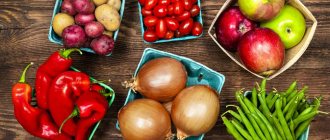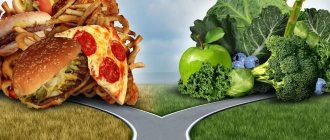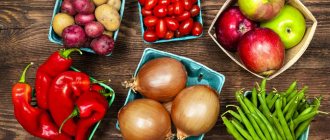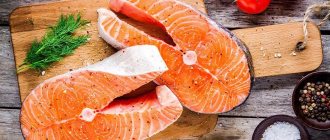Our brain is well versed in tasty foods and distinguishes between hot and cold, bitter and sweet foods thanks to special cells in the tongue - receptors. But the “gourmet” of the body – the digestive system – “knows a lot” about light and heavy foods. As you understand, heavy food is not the weight of the portion on the plate, but something else.
The first and main sign of heavy food is high calorie content.
It should be noted that the calorie content of food depends on the chemical composition, and not on the recipe for preparing the dish. For example, 100 grams of walnuts contain more than 600 kilocalories, and a 100-gram donut contains about 350.
Heavy food
All products of animal origin are considered heavy food:
- meat;
- salo;
- dairy products.
The list is supplemented by:
- sugar;
- flour products;
- chocolate;
- sweet carbonated drinks;
- bananas;
- potato;
- grape.
Unfortunately, all the “delicacies” invented by chefs are, in most cases, heavy food.
Slow digestion in the stomach and small intestine is the second sign of heavy food.
The method of preparation matters. Just imagine - ordinary chicken eggs, depending on the cooking method, can be either heavy or light food. A heavy food option is scrambled eggs, a light option is soft-boiled eggs.
Food that is hard, salty, spicy and fatty is difficult to digest.
How long does it take for food to be digested in the human stomach?
Many people, even those who monitor their diet, do not take into account such a factor as the time it takes for food to be digested in the stomach and what it affects, so in this article we will look in detail at how long it takes for food to be digested in the human stomach and what affects the speed of digestion.
What determines the rate of food digestion over time?
- Drinking water and other liquids during meals. It is not recommended to drink water and drinks during meals, as they dilute the gastric juice and the digestion time of food increases (or the food is not completely digested).
- Many products after heat treatment (cooking, frying, stewing) take longer to be absorbed in the human body (the time for assimilation of products increases).
- Cold food is digested faster over time.
- Food eaten at lunch is digested faster than food eaten in the morning and evening.
- The speed of digestion in the stomach and absorption in the body is greatly influenced by the type and amount of food consumed, since different foods are absorbed at different speeds (from several minutes to several hours), and when they are mixed, the digestion time can increase.
Of the listed factors that significantly influence how quickly the food eaten and drinks drunk will be digested, let us dwell in more detail on the speed of digestion of all products separately and consider how many hours various foods are digested (meat, fish, cereals, vegetables, fruits, etc. .) in the human stomach.
Table: how much food is digested in the human stomach
Product nameProduct digestion time
| Water and drinks | |
| Water (drink on an empty stomach) | immediately enters the intestines |
| Vegetable and fruit juices | 15-30 minutes |
| Tea | About 60 minutes |
| Broth (vegetable, chicken, meat) | 20-40 minutes |
| Vegetables and greens | |
| Jerusalem artichoke (earthen pear) | 1.5-2 hours |
| Potatoes (new potatoes) | 2 hours |
| Boiled potatoes | 2-3 hours |
| Fried potato | 3-4 hours |
| Carrots (fresh) | 50-60 minutes |
| White cabbage (fresh) | 3 hours |
| Sauerkraut | 4 hours |
| Beetroot (boiled) | 45-55 minutes |
| Tomatoes | 30-40 minutes |
| Cucumber | 30-40 minutes |
| Bulgarian pepper | 30-40 minutes |
| Salad | 30-40 minutes |
| Greenery | 30-40 minutes |
| Zucchini (boiled) | 40-50 minutes |
| Corn (boiled) | 40-50 minutes |
| Corn (canned) | partially digested for at least several hours |
| Salads dressed with vegetable oil | 50-60 minutes |
| Mushrooms | 5-6 hours |
| Fruits and berries | |
| Orange | 30 minutes |
| Grapefruit | 30 minutes |
| Grape | 30 minutes |
| Cherry | 40 minutes |
| Peach | 40 minutes |
| Pear | 40 minutes |
| Apple | 40 minutes |
| Kiwi | 20-30 minutes |
| Banana | 45-50 minutes |
| A pineapple | 40-60 minutes |
| Mango | 1.5-2 hours |
| Legumes | |
| Lentils | 3 hours |
| Peas | 2-2.5 hours |
| Green peas | 2-2.5 hours |
| Beans | 3 hours |
| Soybeans | 2 hours |
| Dried fruits and nuts | |
| Dates | 2 hours |
| Raisin | 2 hours |
| Prunes | 3 hours |
| Nuts (walnuts, pine, hazelnuts, peanuts) | 3 hours |
| Seeds (seeds) of sunflower, pumpkin, sesame | 2 hours |
| Cereals and porridges | |
| Millet | 60-80 minutes |
| Rice | 60-80 minutes |
| Buckwheat (buckwheat porridge) | 60-80 minutes |
| Barley porridge | 60-80 minutes |
| Oatmeal | 60-80 minutes |
| Milk and dairy products | |
| Milk | 2 hours |
| Fermented milk drinks (for example, kefir) | 60 minutes |
| Homemade cheese | 90 minutes |
| Brynza | 90 minutes |
| Low-fat cottage cheese | 90 minutes |
| Fat cottage cheese | 2 hours |
| Hard cheese | 4-5 hours |
| Yogurt | 2 hours |
| Ice cream | 2-2.5 hours |
| Meat | |
| Chicken meat | 1.5-2 hours |
| Turkey | 2 hours |
| Pork | 3.5-5 hours |
| Beef | 3-4 hours |
| Mutton | 3-3.5 hours |
| Salo | At least 5-6 hours |
| Dumplings | 3-3.5 hours |
| Fish and seafood | |
| Lean fish (eg cod) | 30 minutes |
| Fatty fish (herring, trout, salmon) | 50-80 minutes |
| Shrimps | 2-2.5 hours |
| Seafood Cocktail | 2.5-3 hours |
| Flour products | |
| Bread (wheat, rye) | 3-3.5 hours |
| Pasta, spaghetti | 3-3.2 hours |
| Eggs | |
| Egg white | 30 minutes |
| Egg yolk | 45 minutes |
| Scrambled eggs (fried eggs), omelet | 2-3 hours |
| Boiled egg | 2-2.5 hours |
| Sweets | |
| Chocolate | 2 hours |
| Honey | 1-1.5 hours |
| Marshmallow | 2 hours |
| Halva | 3 hours |
| Gum | not digested (leaves the body within 12-36 hours) |
With a detailed review of the table presented, we can conclude that the digestion time in the stomach for various categories of products is:
- Water and drinks are absorbed within 20 minutes.
- Vegetables are digested within 30-60 minutes (with the exception of vegetables containing large quantities of starch).
- Fruits and berries are digested within 20-40 minutes.
- Legumes are digested within 2 hours (120 minutes).
- Cereals and porridges are digested within 2 hours (120 minutes).
- Nuts and seeds are digested within 3 hours (180 minutes).
- Milk and dairy products are digested within 2 hours (120 minutes).
- Fish and seafood are digested within 1 hour (60 minutes).
- Poultry meat is digested within 2.5-3 hours.
- Cattle meat is digested within 4-6 hours.
- Eggs are digested within 40-45 minutes.
Note: the most quickly digestible foods are berries, fruits (excluding banana and avocado) and vegetables (excluding potatoes and Jerusalem artichoke), as well as fruit and vegetable juices.
And products such as coffee, tea with milk, hard cheese, canned fish and meat, stewed meat, pate take a long time to digest or leave the human body without being digested (partially or completely).
Interesting facts and useful tips about eating and digestion
- More thoroughly chewed food is digested better and faster.
- It is healthier for the body to eat foods that have the same digestion and absorption time to reduce the load on the stomach.
- Products with a high protein content are best consumed only warm (they take longer to digest in the stomach, due to which all proteins beneficial to the body are broken down). Cold protein products do not have time to be digested in the stomach and are sent to the intestines, which can lead to unpleasant consequences (gastrointestinal upset, constipation, bloating).
- It is better not to drink water and drinks during meals, so as not to dilute the gastric juice. By the way, ordinary drunk water is absorbed quickly (drinking on an empty stomach), while it does not linger in the stomach and is immediately sent to the intestines.
- Nuts and seeds are better absorbed if they are first soaked overnight in water and then crushed.
- Vegetables are better absorbed and bring more benefits to the body when they are not seasoned with oils (vegetable, olive), which prevent them from being broken down in the stomach (by covering them with a “protective” film).
We hope the table indicated in the article helped you find answers to questions such as how much oatmeal in water, sauerkraut, canned corn, low-fat cottage cheese, dumplings, chewing gum, lard, fish, meat, bread, apple, tangerines, bananas, etc. is digested in the stomach. grapes, persimmons and mushrooms.
Source: https://infoeda.com/skolko-perevarivaetsya-pishha-v-zheludke-cheloveka.html
Light food
In contrast to heavy food, light food contains few calories and, accordingly, is easily and quickly digested. On the "easy list":
- zucchini;
- carrot;
- cucumbers;
- beet;
- currant;
- raspberries;
- citrus.
...and besides them:
- vegetable or meat puree soups;
- boiled meat or fish;
- steamed vegetables;
- fish and meat;
- vegetable purees;
- casseroles;
- well-cooked porridge;
- jelly;
- low-fat cottage cheese;
- sugar-free mousses.
Light food promotes mental work, heavy food will provide you with energy longer during physical activity.
"East is a delicate matter!" Tibetan sages believe that a skillful combination of products changes the quality of food. For example, rice is a light food, but milk is a heavy food. If milk is heated with saffron, it becomes “light”, and rice cooked in milk becomes “heavy”. You should not mix light and heavy foods in one meal, very cold and very hot dishes, food left over from previous meals and freshly prepared food.
How long do foods take to digest: a list of easily digestible and difficult to digest foods
Based on the above table and the information indicated there, we can conclude that all products are divided into easily digestible and difficult to digest.
Easily digestible foods include:
All fruits and vegetables, as long as they are consumed in reasonable quantities. These products are digested by our body easier and faster than any other, which is facilitated by the fiber they contain:
- Apricots.
- Citrus.
- Bananas.
- Plums.
- Strawberry.
- Cherries, cherries.
- Cherry plum.
- Watermelon.
- Melon.
- Tomatoes.
- Cucumbers.
- Different types of cabbage.
- Greenery.
- Our body also digests cereals, porridges, and especially boiled rice relatively easily.
- Chicken meat and lean fish, such as boiled fillet, pollock, and steamed hake, are easy to digest.
Fillet
- It should be noted that vegetables processed in a certain way, for example, steamed, grilled, baked, are digested much faster than fresh ones.
- The same can be said about fish and chicken. Poultry meat is better digestible if it is steamed or simply boiled; fish is steamed.
The list of difficult-to-digest foods consists of the following foods:
- First of all, hard-to-digest foods can be called those that consist primarily of fats. These are pork, beef, lard, smoked meats.
- Also, our body does not digest sweets , especially low-quality ones, like chocolate fudge.
- Any fast food and other “street” food is also difficult for the stomach to digest.
Badly
- Despite the fact that legumes cannot be called bad food for our body, they are quite difficult to digest. At the same time, it is important to note the fact that their excessive consumption can provoke problems in the gastrointestinal tract, for example, flatulence, diarrhea, constipation, etc.
Do you need a diet?
“War, war, but lunch is on schedule!” - said the King of Prussia, Frederick Welhelm the First, and he was absolutely right!
It will be easier for your digestive system if you eat at the same time every day. By the time of the meal, the required amount of gastric, pancreatic juice and bile will be produced.
Higher calorie foods should be eaten in the first half of the day in order to stock up on the necessary energy, and for dinner, nutritionists recommend lighter meals.
The theoretical part of the article is finished. It's time to move on to practice. But in practice, for many of us, everything is different. Rushing to work, we don’t have time to have breakfast, we snack on cookies or a hot dog during the lunch break, and in the evening we “have a blast.” The result is indigestion, bloating, heartburn, constipation.
And who among us is able to refuse a picnic and exchange vegetable puree soup for aromatic kebab? That's the same! When you feel a piece of juicy meat roasted over an open fire in your mouth, you, by and large, don’t care that kebab is heavy food!
Digestion in the stomach
A person prone to overeating throws different foods into his body as if it were a furnace. But firewood burns for approximately the same time, and different foods take different times to digest. Knowing how much a particular product is processed, you can intelligently approach the creation of a menu, selecting food that decomposes in approximately the same time.
Important! Proteins, fats and carbohydrates need different times to break down. Try not to eat too often, knowing that the previous portion is still in the stomach. If you add difficult-to-digest foods to your diet, your stomach will be heavy. Also, stop eating at least 4 hours before bed.
The likelihood of chronic diseases associated with a dairy diet
Oddly enough, some doctors claim that cheese in some cases causes pancreatic diseases, including diabetes. As mentioned above, given how much cheese is digested, it should not be surprising that such an important organ for the body fails. The insides of a person are so closely connected with each other, they work so harmoniously that as soon as one organ goes astray, the whole system collapses. When the intestines become clogged with undigested masses, all organs of the gastrointestinal tract suffer.











